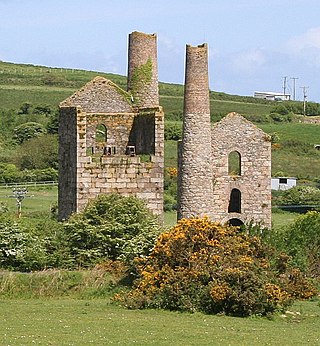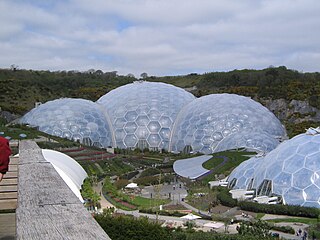
Cornwall is a ceremonial county in South West England. It is recognised by Cornish and Celtic political groups as one of the Celtic nations, and is the homeland of the Cornish people. The county is bordered by the Atlantic Ocean to the north and west, Devon to the east, and the English Channel to the south. The largest urban area in the county is a conurbation that includes the former mining towns of Redruth and Camborne, and the county town is the city of Truro.

Devon is a ceremonial county in South West England. It is bordered by the Bristol Channel to the north, Somerset and Dorset to the east, the English Channel to the south, and Cornwall to the west. The city of Plymouth is the largest settlement, and the city of Exeter is the county town.

Dartington Hall in Dartington, near Totnes, Devon, England, is an historic house and country estate of 1,200 acres (4.9 km2) dating from medieval times. The group of late 14th century buildings are Grade I listed; described in Pevsner's Buildings of England as "one of the most spectacular surviving domestic buildings of late Medieval England", along with Haddon Hall and Wingfield Manor. The medieval buildings are grouped around a huge courtyard; the largest built for a private residence before the 16th Century, and the Great Hall itself is the finest of its date in England. The west range of the courtyard is regarded nationally as one of the most notable examples of a range of medieval lodgings. The medieval buildings were restored from 1926 to 1938.

The Department for Environment, Food and Rural Affairs (Defra) is a ministerial department of the Government of the United Kingdom. It is responsible for environmental protection, food production and standards, agriculture, fisheries and rural communities in the entire United Kingdom. Concordats set out agreed frameworks for cooperation, between it and the Scottish Government, Welsh Government and Northern Ireland Executive, which have devolved responsibilities for these matters in their respective nations.
Penryn Campus is a university campus in Penryn, Cornwall, England, UK. The campus is occupied by two university institutions: Falmouth University and the University of Exeter, with the shared buildings, facilities and services provided by Falmouth Exeter Plus.

Falmouth University is a specialist public university for the creative industries based in Falmouth and Penryn, Cornwall, England. Founded as Falmouth School of Art in 1902, it was later known as Falmouth College of Art and Design and then Falmouth College of Arts until 2012, when the university college was officially granted full university status by the Privy Council.
Sir Eric Dancer is a British businessman and formerly Lord-Lieutenant of Devon.
The Institute of Cornish Studies is a research institute in west Cornwall, England, United Kingdom, affiliated with the University of Exeter. Formerly at Pool, near Redruth, then in Truro, it is now on the Penryn Campus near Penryn, Cornwall.

Pool is a village in Carn Brea civil parish in west Cornwall, England. It is bypassed by the A30, on the A3047 between Camborne and Redruth, between Tuckingmill and Illogan Highway.

The economy of Cornwall in South West England is largely dependent upon agriculture, followed by tourism. Cornwall is one of the poorest areas in the United Kingdom with a GVA of 70.9% of the national average in 2015. It is one of four areas in the UK that qualified for poverty-related grants from the EU. Farming and food processing contributed £366 million to the county's economy in 2006, equal to 5.3% of Cornwall’s total GVA. The agriculture industry in Cornwall employed 9,500 people as of 2011. 23,700 more were employed in the food industry in Cornwall. The Cornish economy also depends heavily on its successful tourist industry, which contributes 12% of Cornwall's GDP and supports about 1 in 5 jobs. Tourism contributed £1.85 billion to the Cornish economy in 2011.
Clyst St Mary is a small village and civil parish 3 miles (4.8 km) east of Exeter on the main roads to Exmouth and Sidmouth in East Devon. The name comes from the Celtic word clyst meaning 'clear stream'. The village is a major part of the electoral ward of Clyst Valley. At the 2011 Census this ward population was 2,326.

Hill farming or terrace farming is an extensive farming in upland areas, primarily rearing sheep, although historically cattle were often reared extensively in upland areas. Fell farming is the farming of fells, a fell being an area of uncultivated high ground used as common grazing. It is a term commonly used in Northern England, especially in the Lake District and the Pennine Dales. Elsewhere, the terms hill farming or pastoral farming are more commonly used.

The Cornwall College Group is a further education college situated on eight sites throughout Cornwall and Devon, England, United Kingdom, with its headquarters in St Austell.

Agriculture in the United Kingdom uses 69% of the country's land area, employs 1% of its workforce and contributes 0.5% of its gross value added. The UK currently produces about 54% of its domestic food consumption.

Peter Randall-Page RA is a British artist and sculptor, known for his stone sculpture work, inspired by geometric patterns from nature. In his words "geometry is the theme on which nature plays his infinite variations, fundamental mathematical principle become a kind of pattern book from which nature constructs the most complex and sophisticated structures".

Charles George Eustice is a British politician and former public relations executive who held office as Secretary of State for Environment, Food and Rural Affairs between 2020 and 2022. A member of the Conservative Party, he served as the Member of Parliament (MP) for Camborne and Redruth from 2010 to 2024.

Launceston is a town, ancient borough, and civil parish in Cornwall, England, United Kingdom. It is 1 mile (1.6 km) west of the middle stage of the River Tamar, which constitutes almost the entire border between Cornwall and Devon. The landscape of the town is generally steep particularly at a sharp south-western knoll topped by Launceston Castle. These gradients fall down to the River Kensey and smaller tributaries.

The University of Exeter is a research university in the West Country of England, with its main campus in Exeter, Devon. Its predecessor institutions, St Luke's College, Exeter School of Science, Exeter School of Art, and the Camborne School of Mines were established in 1838, 1855, 1863, and 1888 respectively. These institutions later formed the University of Exeter after receiving its royal charter in 1955. In post-nominals, the University of Exeter is abbreviated as Exon., and is the suffix given to honorary and academic degrees from the university.
Rosemary S. Hails is a British population ecologist and entomologist and the current Director of Science and Nature at the National Trust for Places of Historic Interest or Natural Beauty. Prior to this appointment she was the Director of Biodiversity and Ecosystem Science for UK Centre for Ecology and Hydrology, managing and directing the science of 350 ecologists and hydrologists, in collaboration with the Science Director for Water and Pollution Science. Professor Hails successfully led the development of UKCEH's national capability research programme delivered by the Research Centre, which cuts across the complete portfolio of expertise. She has led the Valuing Nature Programme for NERC, since October 2014, and is currently a CoInvestigator in the NERC Funded "RENEW" and "RestReco" Projects. In 2000, she was made a Member of the Most Excellent Order of the British Empire (MBE) for services to environmental research.













